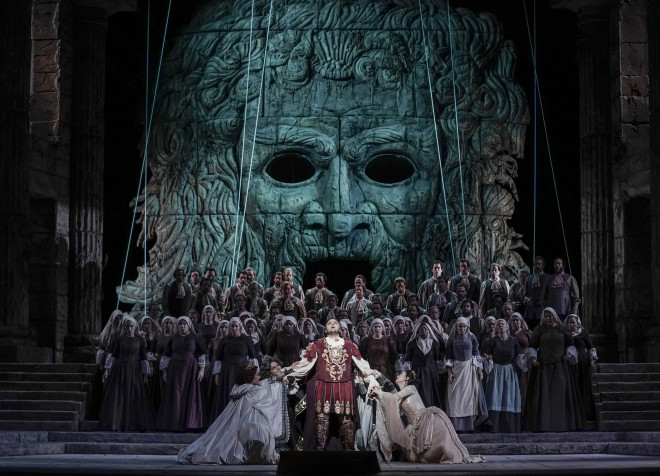Mozart’s Idomeneo brought by a subtle cast takes New York viewers into a universe that mixes aesthetics and inspirations, traveling between worlds and times in the company of Greco-Roman gods, on the verge of superproduction.
The Metropolitan Opera House in New York shows once again its taste for blends and classicisms, in particular with this Mozartian opera set in Crete, after the Trojan War, but in a Roman context (the god in question is Neptune, not Poseidon). The MET is also placed with this staging by Jean-Pierre Ponnelle in a perspective of epoch (e), that of this 1781 opera, marked by “exoticism”, by the century of the Grand Tour and by an extravagant rediscovery of treasures of antiquity. The production questions precisely this perspective, with on the one hand the point of view of Europe of crinoline dresses and powdered wigs, on the other that of an imaginary of the East between Greek divinities, broken statues and Chinese hats. The two visions intersect through costumes or poses, the battlements of a column become a visual motif.
In this strange world, where the engravings of Rome à la Piranèse are the background to this very particular spirit, the choir plays a fundamental role. Particularly numerous, they first surprise with their great stage movements reminiscent of King Vidor, acting fully as a scenic backdrop, but also vocal, with commitment and power. The resonances of the sopranos are more present in the echo while the altos provide an effective center line. Tenors and basses respond to them (and to each other) with amplitude but slightly neglecting diction. The soprano Amani Cole-Felder and the mezzo Cierra Byrd offer a particularly precise and sustained interpretation of the Cretans, especially in the high notes, with harmonic resonances for the first and rich and soft timbre for the second, even if their interventions shine above all from the their liveliness. The tenor Manase Latu and the bass-baritone Vladyslav Buialskyi, for their part, accentuate a mutual work on musicality and text but remain more discreet (the latter is like an echo of the former).
Conductor Manfred Honeck knits on Mozart’s score along with strings, giving everyone a place of honor, even if the hole sometimes exceeds the voice. The very high technical and musical level of these instrumentalists is expressed in particular in the wooden desks.
Ying Fang offers a very refined interpretation of Ilia, in an aesthetic more of a Greek goddess than an 18th century Italian princess. Her powerful tone is lightly vibrated, with great flexibility. The fluid intonation (a certain difficulty in Mozart’s pieces) gives her parts an almost obsolete baroque character, but which finds a privileged place in the recitatives, giving free rein to the richness of her refined vocal games.
Elettra (Federica Lombardi), is here a powerful and capricious red queen, whose high notes sometimes appear drawn. A little hesitant in musical choices at the beginning of the opera, she gradually takes a real place in the musical action, with extensive interventions that highlight the smoothness of her technical approach.
Mezzosoprano Kate Lindsey embodies Idamante with a particular (and presumed) tonal work for this type of role. However, the singer loses in power, the poetry of her soft interventions, all in roundness, getting lost in the great ensembles.
The King of Crete and his advisor dominate the male cast. Michael Spyres immediately installs the royalty for the lead role. The placed voice unfolds incredible vocalizations of agility, with a timbre all in simplicity and subtlety.
The presence of Paolo Fanale as Arbace’s confidant is much more discreet. His interesting timbre supports pretty ornamentation on a large vibrato (original for such a light voice, which sometimes lacks power, especially as it lacks intonation). The High Priest, Issachah Savage, has only a brief speech, notable for his deep breath holding, which holds a surprising power and strangely echoes Scott Conner in Neptune. The latter refuses to offer menacing intonations and instead proposes a soft god, with a wide bass vibrato, with a sober tone and a choice of not held but blown endings, as if it really came from the massive stone statue that adorns the stage, before getting lost in the Cretan wind.
Because Neptune himself, in a splendid scenic game of veils and projections, will have accompanied all this amazing work, and for a long time greeted by the public relieved as the heroes: finally Neptune will not have been so bad.



